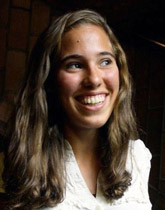The final episode of the hit television program Friends aired on May 6, 2004. The sitcom was watched by 52.46 million viewers, making it the fourth most watched television series finale in U.S. history. Even now, it lives on through TV syndication.
The show’s ongoing popularity caught the attention of Enrica Rosato, a third-year linguistics major. She wanted to figure out, using her academic expertise, what attracted so many viewers to Friends. What she discovered she took with her to Carnegie Mellon’s Meeting of the Minds.
The annual campus-wide undergraduate research symposium gives students a chance to share their work through poster sessions, oral presentations, art installations, prototype demonstrations, and performances. More than 450 students take part in the event held in the University Center.

Rosato is presenting in the Pake Room on the UC’s second floor. To make those in the audience more comfortable as she sets up her computer and projector, she initiates small talk that would have made the Friends characters feel right at home. Her project is titled, “A Comparative Analysis of Naturalistic and Scripted Conversation,” in which she looks at language on the pragmatic level, comparing the natural everyday conversation among friends to the dialogue that screenwriters create.
Before beginning, she glances over at the student volunteer who will keep track of her time; presentations can’t last more than 10 minutes. When he gives her the cue to begin, she smiles at the crowd, recognizing more than a few familiar faces, both classmates and professors.
She then starts her explanation about what made Friends resonate with its audience: Each of the main characters, she explains, was well defined. No matter what happened with the plot, the audience knew how each of the characters would respond. Joey, Chandler, Monica, Phoebe, Rachel, and Ross actually listened to what was being said and acted according to their character traits. Sounds like a simple formula, but dozens and dozens of canceled shows, she points out, have failed to grasp that fundamental linguistic concept. It’s that realism, she adds, that may be why reality shows have proliferated on television.
After her presentation ends, in the allotted time, Rosato has plenty of time to take in some other projects, ranging from the arts to computer science to design to engineering to the humanities to science. No word yet on whether she has a pilot for a sitcom in mind.
—Devin Beahm (DC’12)



